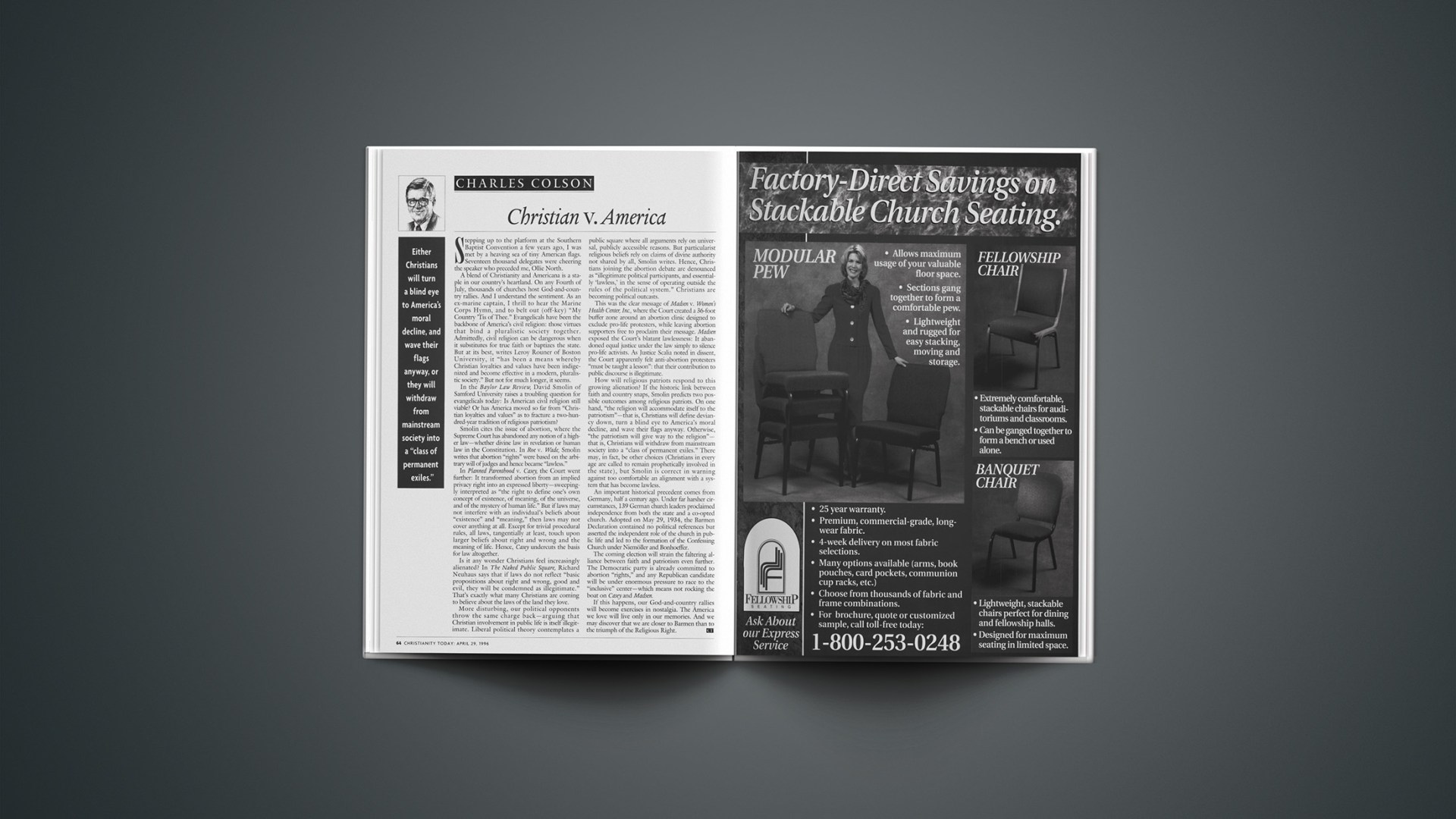Stepping up to the platform at the Southern Baptist Convention a few years ago, I was met by a heaving sea of tiny American flags. Seventeen thousand delegates were cheering the speaker who preceded me, Ollie North.
A blend of Christianity and Americana is a staple in our country’s heartland. On any Fourth of July, thousands of churches host God-and-country rallies. And I understand the sentiment. As an ex-marine captain, I thrill to hear the Marine Corps Hymn, and to belt out (off-key) “My Country ‘Tis of Thee.” Evangelicals have been the backbone of America’s civil religion: those virtues that bind a pluralistic society together. Admittedly, civil religion can be dangerous when it substitutes for true faith or baptizes the state. But at its best, writes Leroy Rouner of Boston University, it “has been a means whereby Christian loyalties and values have been indigenized and become effective in a modern, pluralistic society.” But not for much longer, it seems.
In the Baylor Law Review, David Smolin of Samford University raises a troubling question for evangelicals today: Is American civil religion still viable? Or has America moved so far from “Christian loyalties and values” as to fracture a two-hundred-year tradition of religious patriotism?
Smolin cites the issue of abortion, where the Supreme Court has abandoned any notion of a higher law–whether divine law in revelation or human law in the Constitution. In Roe v. Wade, Smolin writes that abortion “rights” were based on the arbitrary will of judges and hence became “lawless.”
In Planned Parenthood v. Casey, the Court went further: It transformed abortion from an implied privacy right into an expressed liberty–sweepingly interpreted as “the right to define one’s own concept of existence, of meaning, of the universe, and of the mystery of human life.” But if laws may not interfere with an individual’s beliefs about “existence” and “meaning,” then laws may not cover anything at all. Except for trivial procedural rules, all laws, tangentially at least, touch upon larger beliefs about right and wrong and the meaning of life. Hence, Casey undercuts the basis for law altogether.
Is it any wonder Christians feel increasingly alienated? In “The Naked Public Square,” Richard Neuhaus says that if laws do not reflect “basic propositions about right and wrong, good and evil, they will be condemned as illegitimate.” That’s exactly what many Christians are coming to believe about the laws of the land they love.
More disturbing, our political opponents throw the same charge back–arguing that Christian involvement in public life is itself illegitimate. Liberal political theory contemplates a public square where all arguments rely on universal, publicly accessible reasons. But particularist religious beliefs rely on claims of divine authority not shared by all, Smolin writes. Hence, Christians joining the abortion debate are denounced as “illegitimate political participants, and essentially ‘lawless,’ in the sense of operating outside the rules of the political system.” Christians are becoming political outcasts.
This was the clear message of Madsen v. Women’s Health Center, Inc., where the Court created a 36-foot buffer zone around an abortion clinic designed to exclude pro-life protesters, while leaving abortion supporters free to proclaim their message. Madsen exposed the Court’s blatant lawlessness: It abandoned equal justice under the law simply to silence pro-life activists. As Justice Scalia noted in dissent, the Court apparently felt anti-abortion protesters “must be taught a lesson”: that their contribution to public discourse is illegitimate.
How will religious patriots respond to this growing alienation? If the historic link between faith and country snaps, Smolin predicts two possible outcomes among religious patriots. On one hand, “the religion will accommodate itself to the patriotism”–that is, Christians will define deviancy down, turn a blind eye to America’s moral decline, and wave their flags anyway. Otherwise, “the patriotism will give way to the religion”–that is, Christians will withdraw from mainstream society into a “class of permanent exiles.” There may, in fact, be other choices (Christians in every age are called to remain prophetically involved in the state), but Smolin is correct in warning against too comfortable an alignment with a system that has become lawless.
An important historical precedent comes from Germany, half a century ago. Under far harsher circumstances, 139 German church leaders proclaimed independence from both the state and a co-opted church. Adopted on May 29, 1934, the Barmen Declaration contained no political references but asserted the independent role of the church in public life and led to the formation of the Confessing Church under Niemoller and Bonhoeffer.
The coming election will strain the faltering alliance between faith and patriotism even further. The Democratic party is already committed to abortion “rights,” and any Republican candidate will be under enormous pressure to race to the “inclusive” center–which means not rocking the boat on Casey and Madsen.
If this happens, our God-and-country rallies will become exercises in nostalgia. The America we love will live only in our memories. And we may discover that we are closer to Barmen than to the triumph of the Religious Right.
Copyright © 1996 Christianity Today. Click for reprint information.










